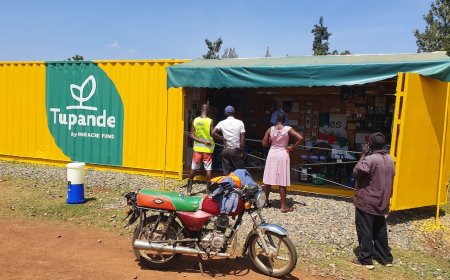Certificate in Nursing in Kenya: Course Duration; Requirements, Colleges And Fees For 2024
Are you interested in pursuing a nursing career in Kenya? Discover the requirements for a Certificate in Nursing, the colleges offering the program, and associated fees.

Nursing, a cornerstone of healthcare in Kenya, is more than a profession; it's a calling that combines compassion, care, and medical expertise. The journey to becoming a nurse in Kenya starts with a fundamental step – obtaining a Certificate in Nursing. This credential opens doors to a world where one can make a tangible difference in the lives of individuals and communities.
The landscape of nursing in Kenya is diverse, reflecting the varied healthcare needs of its population. From bustling urban hospitals to remote rural clinics, nurses form the backbone of healthcare delivery. They are often the first point of contact for patients, playing a crucial role in the diagnosis, care, and management of health conditions.
In recent years, the demand for qualified nurses has surged in Kenya, driven by an increasing awareness of the critical role they play in healthcare. The government, recognizing this need, has strengthened nursing education, ensuring that nurses are well-equipped to meet the challenges of modern healthcare.
Importance of Obtaining a Certificate in Nursing
Embarking on a nursing career in Kenya starts with a Certificate in Nursing. This certificate is more than just a piece of paper; it symbolizes a deep understanding of the basics of nursing care, patient management, and medical ethics. It marks the beginning of a lifelong journey of learning, compassion, and commitment to patient welfare.
Obtaining this certificate is a gateway to a rewarding career in nursing. It is the first step towards specialization in various fields such as midwifery, pediatric care, or surgical nursing. It also opens up opportunities for further education and career advancement, allowing nurses to progress to diploma and degree levels.
Moreover, a Certificate in Nursing is crucial for registration with the Nursing Council of Kenya. This registration is a testament to the nurse's competency, dedication, and adherence to the highest standards of healthcare delivery. It's a badge of honor, signifying trust and reliability in the eyes of patients and healthcare institutions alike.
In the Kenyan context, where healthcare challenges are as diverse as its cultural tapestry, nurses with this certificate play a pivotal role. They are not just healthcare providers but also educators, counselors, and advocates for their patients. They navigate the complexities of healthcare while providing compassionate care, making a significant impact on the health and well-being of the Kenyan population.
READ ALSO: Top 21 University Courses for B+, B, or B- And Requirements For Students in Kenya 2024
Requirements for Certificate in Nursing in Kenya
Basic Entry Requirements Across Institutions
Embarking on the journey to become a nurse in Kenya begins with meeting the basic entry requirements for a Certificate in Nursing. These prerequisites are crucial as they lay the foundation for a successful career in nursing. The requirements, while having some variations across different colleges and universities, generally align to ensure a standard level of competence and knowledge among nursing professionals.
The harmonized entry requirements across Kenyan institutions are:
- Mean Grade: Aspiring nurses must have attained at least a C- (Minus) in their Kenya Certificate of Secondary Education (KCSE) examination. This grade reflects a basic understanding of high school education, which is essential for grasping nursing concepts.
- Language Proficiency: A C- (Minus) in English or Kiswahili is mandatory. Proficiency in either of these languages is vital for effective communication with patients and colleagues in Kenya’s multilingual healthcare settings.
- Biological Sciences: A minimum of a C- (Minus) in Biology or Biological Sciences is required. This requirement underlines the importance of a foundational understanding of human biology in nursing.
- Additional Science Subject: Candidates must have scored at least a D+ (Plus) in either Chemistry or Physics. This ensures a basic grasp of the scientific principles relevant to nursing.
Specific Requirements at Kenya Medical Training College (KMTC)
The Kenya Medical Training College (KMTC), a leading institution in nursing education in Kenya, has specific entry requirements for its Certificate in Nursing program. These requirements not only align with the general prerequisites but also include additional criteria to ensure the selection of candidates who can uphold the high standards of nursing care that KMTC is renowned for.
KMTC's entry requirements are:
- KCSE Performance: A minimum of a C- (Minus) grade is required in the KCSE.
- Language and Biological Science Grades: Applicants must have a C- (Minus) in both English/Kiswahili and Biology/Biological Sciences.
- Optional Science Subject: A C- (Minus) or higher in either Chemistry, Mathematics, or Physics is necessary.
These requirements are designed to select students with the aptitude for nursing. KMTC recognizes that nursing is a demanding profession that requires a strong foundation in language for communication, biological sciences for understanding human health, and an additional science subject to broaden the scientific knowledge base of nursing students.
Duration and Structure of the Course
General Course Duration and Structure
The journey to becoming a certified nurse in Kenya is structured to provide comprehensive training. The Certificate in Nursing course, unlike many other certificate programs, takes two and a half years to complete. This extended period is not just a matter of time but a deliberate design to ensure that students receive in-depth theoretical knowledge and extensive practical skills.
During these two and a half years, students undergo rigorous training that encompasses various aspects of nursing. The curriculum is carefully crafted to include foundational subjects in nursing, patient care techniques, and ethical practices in healthcare. It balances classroom learning with practical, hands-on experience in clinical settings. This blend of theory and practice is crucial in preparing students for the real-world challenges of the nursing profession.
Upgrading Options After Completion of the Certificate
Upon completing the Certificate in Nursing, graduates have several pathways for career advancement and further education. One significant option is upgrading the certificate to a Diploma in Community Health Nursing. This upgrading program is an opportunity for nurses to deepen their knowledge, specialize in specific areas, and enhance their skills.
The diploma program builds on the foundation laid by the certificate course, introducing more advanced concepts and techniques in nursing. It often includes specialized modules such as midwifery, pediatric nursing, or surgical nursing, allowing nurses to focus on areas of interest or high demand.
Completing the diploma not only broadens a nurse's scope of practice but also opens up more employment opportunities. It enhances their qualifications for higher positions in healthcare settings and increases their potential for a rewarding career in nursing.
It’s also important to note that registration with the Nursing Council of Kenya (NCK) is a critical step post-completion of the certificate course. This registration is essential for legal practice as a nurse in Kenya. It signifies that the individual has met the required standards of education and is competent to provide safe and effective nursing care.
READ ALSO: KMTC fee structure for government-sponsored students 2024
Colleges Offering Certificates in Nursing in Kenya
Overview of Accreditation and Regulation
In Kenya, the landscape of nursing education is meticulously regulated to maintain high standards. The Ministry of Health, in collaboration with the Nursing Council of Kenya (NCK), oversees the licensing and regulation of colleges offering nursing courses, especially at the certificate level. This strict regulatory framework ensures that the education provided meets the national and international standards required for competent nursing practice.
Students can pursue a certificate in community health nursing either in public institutions or private colleges. However, prospective students must choose institutions that are recognized and accredited by the NCK. Accreditation signifies that the college adheres to the required educational standards, ensuring that graduates are well-prepared for their roles in healthcare.
Description of Select Colleges and Their Unique Offerings
1. Kenya Medical Training College (KMTC):
As a premier institution in Kenya's healthcare education, KMTC offers a Certificate in Nursing, among other medical-related training. With 71 campuses across the country, KMTC stands out for its accessibility to students in various regions. The college is known for its comprehensive curriculum and experienced faculty, focusing on practical skills and clinical exposure. The annual fee for pursuing a Certificate in Nursing at KMTC is approximately Ksh 80,700.
2. Moi Teaching and Referral Hospital Training Centre (MTRH):
Located in Eldoret, MTRH is renowned for its quality training and access to one of Kenya's largest referral hospitals. This gives students a unique opportunity for hands-on learning in a real-world healthcare setting. The fees range between Ksh 80,000 to Ksh 100,000 annually.
3. Clive Irvine College of Nursing, PCEA Chogoria Hospital:
This college offers both diploma and certificate courses in nursing. Affiliated with Chogoria Hospital, the college provides students with practical experience in one of Meru County's most efficient hospitals. Fees for day scholars range from Ksh 95,000 to Ksh 151,400, while boarders pay between Ksh 131,000 and Ksh 141,000.
4. Gertrude's Institute of Child Health and Research, Muthaiga:
This private college specializes in pediatric nursing and other child health-related courses. It adopts an international-inspired curriculum, offering a unique perspective in nursing education.
5. Nairobi Women's Hospital College:
Known for its diverse approach to nursing education, this college allows students to specialize even at the certificate level. The fees vary depending on the specific course, ranging from Ksh 85,000 to Ksh 300,000 per year.
6. Consolata Hospital, Nkubu School of Nursing:
Located in Meru County, this institution focuses on preparing students to serve humanity with compassion. Fees range from Ksh 95,000 to Ksh 150,000.
7. University of Eastern Africa Baraton:
As a university offering certificate courses in nursing, Baraton provides access to significant healthcare facilities in Eldoret. It is known for its qualified instructors and affordable fees, averaging around Ksh 40,000, excluding administrative costs.
8.Fafa Medical Training College, Kakamega:
Established by the County Government of Kakamega, this college adheres to the standard Certificate in Nursing requirements and offers quality training under the Nursing Council of Kenya.
Fees and Financial Considerations
When considering a career in nursing, understanding the financial aspect of education is crucial. The fee structure for a Certificate in Nursing in Kenya varies depending on the institution, with each college having its pricing policy. However, these fees generally cover tuition, lab fees, and other educational expenses but do not include accommodation and living costs.
Fee Structure for Various Colleges
1. Kenya Medical Training College (KMTC):
KMTC is a prime example of a government institution offering quality nursing education at a reasonable cost. For the Certificate in Community Health Nursing, the annual fee is around Ksh 80,000. It's important to note that these fees are exclusive of living and accommodation expenses.
2. Moi Teaching and Referral Hospital Training Centre (MTRH):
In MTRH, the annual fees for the nursing certificate range between Ksh 80,000 to Ksh 100,000. This variation in costs allows some flexibility for students, depending on the specific requirements and resources of the institution.
3. Clive Irvine College of Nursing, PCEA Chogoria Hospital:
The fee structure here is bifurcated for day scholars and boarders. For day scholars, it ranges from Ksh 95,000 to Ksh 151,400, whereas for boarders, it's between Ksh 131,000 to Ksh 141,000. This structure takes into account the additional facilities and services provided to boarding students.
4. Gertrude's Institute of Child Health and Research, Muthaiga:
Being a private institution with a specialized focus, Gertrude's Institute does not have a publicly publicized fixed fee structure. The fees depend on the specific course and scope of the study, requiring prospective students to contact the institute directly for detailed information.
5. Nairobi Women's Hospital College:
This college offers a range of specialized courses at the certificate level, each with its fee structure. The fees range broadly from Ksh 85,000 to Ksh 300,000 per year, reflecting the diversity and depth of the courses offered.
6. Consolata Hospital, Nkubu School of Nursing:
Located in Meru County, the fees at this institution are harmonized, ranging from Ksh 95,000 to Ksh 150,000. This fee structure is subject to changes but provides a general idea of the financial investment required.
7. University of Eastern Africa Baraton:
Known for its affordable fees, Baraton charges an average of Ksh 40,000 for its nursing certificate course, exclusive of administration costs. This makes it an attractive option for students seeking a more budget-friendly path to a nursing career.
8.Fafa Medical Training College, Kakamega:
As a newer institution, Fafa Medical Training College aligns its fees with the general requirements and standards of nursing education in Kenya. Prospective students should inquire directly for specific fee details.
Additional Financial Considerations
Apart from tuition fees, prospective nursing students should also consider additional costs such as textbooks, uniforms, medical equipment, and any other personal expenses. Furthermore, accommodation and living expenses can significantly add to the overall cost, especially for students who choose to study away from home.
Financial aid, scholarships, and grants are often available for students in need, and prospective students should research these options. Some institutions also offer flexible payment plans or work-study programs to help ease the financial burden.
READ ALSO: Kitale National Polytechnic Student Portal 2024: Registration ,E-Learning and Academic Services
FAQs about Certificate in Nursing in Kenya
Are There Private Colleges Offering Certificates in Nursing in Kenya?
- As of the current landscape, no private colleges are authorized by the Nursing Council of Kenya to offer a Certificate in Nursing. The primary provider of this education is the Kenya Medical Training College (KMTC), a government institution. This ensures a standardized quality of nursing education across the country.
How Do I Apply for a Certificate in Nursing at KMTC?
- Applications for the Certificate in Nursing at KMTC are made online. Prospective students should keep an eye on social media, newspapers, or the KMTC website for announcements of intakes, which typically happen in March and September. Once the application window opens, visit the KMTC application portal, fill in the required information, and ensure to apply for the 'Certificate in Community Health Nursing (preservice)' before submitting.
What Are My Career Prospects After Completing the Certificate?
- After obtaining a Certificate in Nursing, graduates are eligible for registration with the Nursing Council of Kenya, allowing them to practice as enrolled nurses, midwives, or community health nurses. This certification opens doors to various healthcare settings, both public and private, across Kenya and potentially abroad. Furthermore, there are opportunities for further education and specialization through diploma and degree programs.
Conclusion
Embarking on a career in nursing through obtaining a Certificate in Nursing in Kenya is a journey of dedication, commitment, and passion. It's a pathway that not only equips individuals with essential medical and healthcare skills but also instills a sense of service to the community.
Nursing education in Kenya, regulated and standardized by the Ministry of Health and the Nursing Council of Kenya, ensures that graduates are well-prepared to meet the demands of the healthcare sector. The journey, though challenging, is rewarding, offering numerous opportunities for growth, specialization, and meaningful contributions to patient care.
The institutions offering this certificate, primarily KMTC, provide a robust curriculum that balances theoretical knowledge with practical experience. The financial investment in this education varies across institutions, but the returns in terms of career prospects and personal fulfillment are immense.
As we conclude, it's clear that a Certificate in Nursing in Kenya is more than just an academic achievement; it's a stepping stone to a noble profession. It is an opportunity to make a difference in the lives of individuals and communities, to be part of a workforce that is at the heart of healthcare, and to embark on a lifelong journey of learning and service.












































































